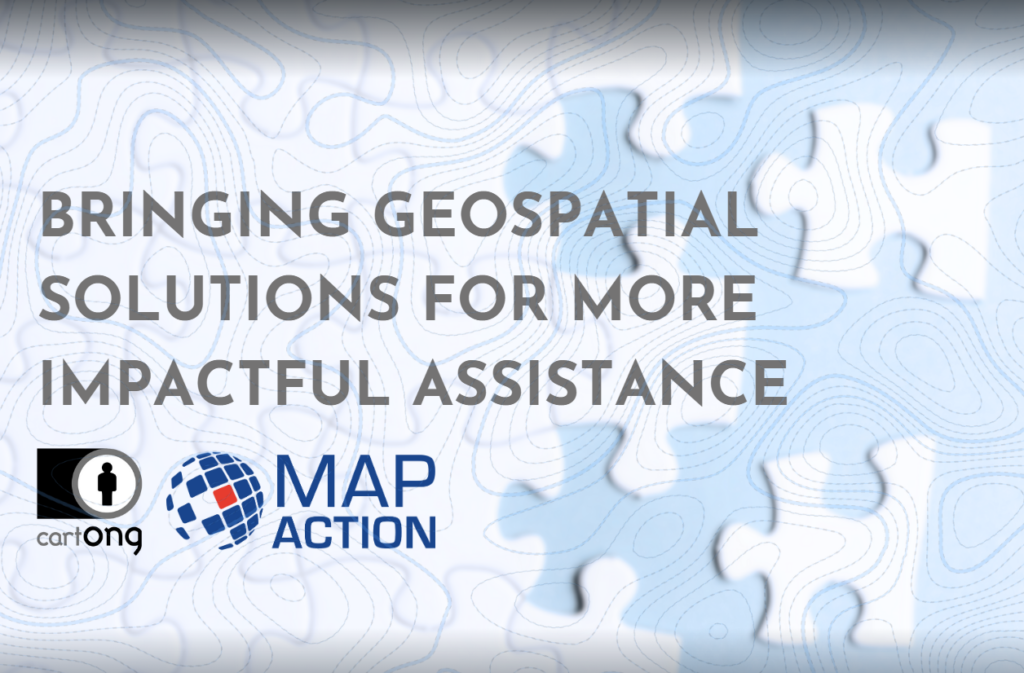From Mexico to South Sudan, Malawi and worldwide, MapAction and CartONG have worked together for nearly a decade to bring geospatial solutions to the humanitarian aid and international development sector. Our underlying core shared values help us support NGOs and aid actors for more impactful assistance.

What happens if information barriers aren’t broken down for humanitarian agencies in emergencies? Food gets sent to the wrong people, search and rescue teams are misinformed, temporary settlements are set up in misguided places. Lives are lost or ruined because the right data was missing.
Breaking down information barriers
At MapAction and CartONG we embrace and live by the same values embedded in a single idea: the application of geospatial technology to improve the quality and impact of humanitarian assistance and development projects. Every map, mapathon, training event, data analysis tool or geospatial element of disaster preparedness we co-strive to create can be the key to getting aid to a stricken community or to understanding and preparing for the worst effects of a drought, flood or health emergency. These shared core values and resources have led to a beautiful cross-channel partnership between UK-based MapAction and France-based CartONG. A partnership that aims to improve the impact of aid actions by providing decision-makers and vulnerable communities with the right data to understand and mitigate any crisis.
Decade-long partnership
Our partnership has already lasted nearly a decade. As part of the Covid-19 response, MapAction seconded staff to help CartONG with the surge of activities in its partnership with Medecins Sans Frontieres (MSF). Having already worked together for several years on various projects, including as part of the H2H Network, a peer-to-peer humanitarian network, MapAction and CartONG signed a Memorandum of Understanding (MoU) to work more closely together in 2020.
READ ALSO: MapAction strengthens partnership with CartONG
READ MORE: CartONG strengthens collaboration with MapAction via the signing of a MoU
CartONG and MapAction have since worked together on a number of different projects. In Mexico, together with UNICEF and the Mexican government, MapAction and CartONG supported the creation of a dashboard aiming to display and monitor real-time information on key education indicators on elementary schools at the national level in order to map COVID-19 affectations before the start of the new school year in 2020. It was created to display and monitor real-time information on key education indicators for all elementary schools. This relied on over 200,000 individual schools uploading their data on a daily basis, and was the first time that this information would be collected and displayed at a national level.

READ ALSO: Developing an analytic dashboard for back to school follow-up in Mexico with MapAction
READ MORE: Post-COVID Progress: Helping Mexican schools reopen
In South Sudan, MapAction and CartONG, together with other partners, worked to identify the data challenges that might slow down ‘final mile’ vaccine delivery in a challenging data environment. One outcome of this work was the Integrated Humanitarian Data Package, that aimed to give quick and easy access to key geographic data that underpins the planning and delivery of vaccination programmes. This pilot health project highlighted the vital role that geospatial technology can play in creating effective healthcare solutions. High quality mapping and data analysis is key to understanding how many people need vaccinating, where they are, and how and where the vaccines can be safely stored and delivered.
READ ALSO: South Sudan data package to support effective and equitable Covid vaccine delivery
In 2023, CartONG and MapAction again used the IHDP to map the outbreak of cholera in Malawi. We are also both partners on the ‘UNICEF Geospatial Hotline’, where interested UN departments can request specific geospatial services from our organisations.
As we look ahead, we know the crises we try to mitigate will become evermore complex and challenging; the funding landscape evermore volatile. That is why our partnership continues to grow and why the alliances we are building with organisations like H2H, UNICEF and Start Network are so vital. We will soon also be announcing a new and exciting joint-project linked to health in West Africa. More on that soon.
We both remain committed to continue to deliver capacity building events and projects worldwide to strengthen disaster preparedness and improve the impact of humanitarian assistance.
Souhaitez-vous lire cet article en français ? Cliquez ici!
